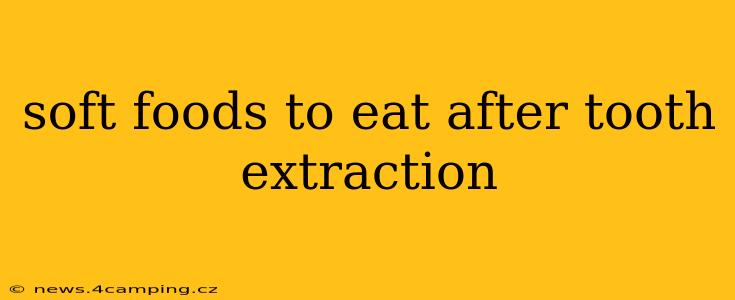Having a tooth extracted can be a bit of a challenge, especially when it comes to figuring out what to eat. Chewing can be painful and uncomfortable, so choosing the right soft foods is crucial for a smooth recovery. This guide will help you navigate the post-extraction diet, ensuring you get the nutrition you need while minimizing discomfort. We'll cover everything from ideal food choices to things to absolutely avoid.
What are the best soft foods to eat after a tooth extraction?
The key is to choose foods that require minimal chewing and are gentle on your gums. Think creamy, smooth, and easily digestible. Here are some excellent options:
- Yogurt: A protein-packed powerhouse, yogurt is a fantastic choice. Opt for plain varieties and add your own fruit for sweetness.
- Applesauce: This classic is easy to swallow and provides valuable nutrients.
- Smoothies: Blend fruits, vegetables, and even protein powder for a nutritious and satisfying meal replacement. Avoid using straws, however, to prevent dislodging the blood clot.
- Mashed potatoes: A comforting staple, mashed potatoes are easy on the gums and provide carbohydrates for energy.
- Scrambled eggs: A good source of protein, scrambled eggs are easily mashed with a fork for effortless consumption.
- Oatmeal: A warm and filling option, oatmeal is easily digestible and can be customized with soft fruits.
- Soups (broth-based): Avoid soups with chunky vegetables or ingredients that require significant chewing. Pureed soups are ideal.
- Pudding: A simple dessert that provides a creamy texture and some essential nutrients.
- Refined pasta: Cook until very soft, then eat with a simple sauce. Avoid anything too chunky.
- Pureed vegetables: Carrots, sweet potatoes, and other vegetables can be pureed for a nutritious and easy-to-eat meal.
What foods should I avoid after a tooth extraction?
It's equally important to know what to avoid. These foods can irritate the extraction site, prolong healing, or even dislodge the blood clot:
- Anything crunchy: Chips, nuts, crackers, and hard candies should be strictly avoided.
- Anything chewy: Tough meats, gummies, and taffy can pull on the extraction site.
- Anything that requires significant chewing: This includes most raw vegetables and whole grains.
- Straws: Avoid using straws, as the sucking action can dislodge the blood clot forming in the socket.
- Alcohol and smoking: These can interfere with healing and increase the risk of infection.
- Hot foods and drinks: These can cause discomfort and swelling.
How long should I eat soft foods after a tooth extraction?
The time you'll need to stick to a soft food diet depends on the complexity of the extraction and your individual healing process. Generally, you'll want to stick to soft foods for at least a week, but your dentist will give you specific instructions based on your situation. You can gradually reintroduce firmer foods as your gums heal and pain subsides.
What if I'm experiencing pain while eating?
If you experience pain while eating, stop immediately and try a different, softer food. You can also try applying a cold compress to the extraction site to reduce swelling and pain. If the pain is severe or persistent, contact your dentist.
Can I eat anything hot after a tooth extraction?
It's generally recommended to avoid very hot foods and drinks immediately following a tooth extraction as the heat can increase inflammation and discomfort in the extraction site. Stick to lukewarm or room-temperature foods and drinks until your gums have healed more.
What are some good recipes for soft foods after tooth extraction?
There are countless delicious and nutritious recipes perfect for a post-extraction diet. Simple pureed soups, smoothies packed with fruits and vegetables, or creamy mashed potato dishes are all excellent options. A quick online search will reveal a wealth of recipes designed specifically for those recovering from oral surgery. Remember to focus on nutrient-rich options to aid your body in healing.
This information is for general guidance only and doesn't replace professional dental advice. Always follow your dentist's instructions regarding post-extraction care. A healthy diet and proper aftercare are crucial for a successful recovery.
